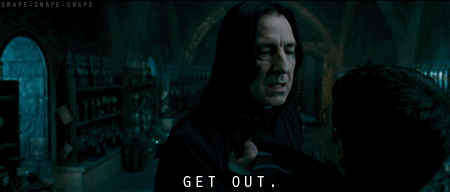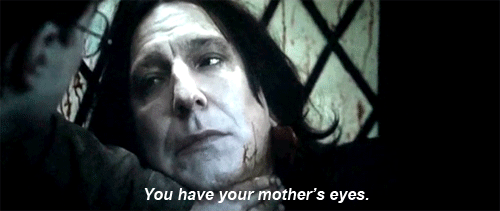The Snape Debate: Rowling Speaks Out
Snape is all grey. You can’t make him a saint: he was vindictive & bullying. You can’t make him a devil: he died to save the wizarding world
— J.K. Rowling (@jk_rowling) November 27, 2015
On Twitter today J.K. Rowling sparked an online debate on Snape and his true nature, whether he was good, bad, or in between. Naturally, Rowling classifies Snape as a gray area. She presents good arguments, though, in why to treat Snape like a hero and why Harry ended up using his name for his second son’s middle name.
Snape was a bully who loved the goodness he sensed in Lily without being able to emulate her. That was his tragedy. https://t.co/nzWhNrBxdH
— J.K. Rowling (@jk_rowling) November 27, 2015
Many Snape supporters tend to use Lily Evans/Potter as an argument for Snape’s goodness or as an excuse for his actions in the series. People often romanticize the way he feels about Lily, and this, however, feels almost like a flaw in the plan. Snape’s actions cannot be excused just because he was devoted to Lily and loved her: Because Snape could never match her own actions and words even after her death, because he clung to jealousy and hatred and projected what he felt about James onto Harry, Snape’s story is a sad one, not a love story.
Snape didn’t die for ‘ideals’. He died in an attempt to expiate his own guilt. He could have broken cover at any time to save himself 1/2
— J.K. Rowling (@jk_rowling) November 27, 2015
but he chose not to tell Voldemort that the latter was making a fatal error in targeting Harry. Snape’s silence ensured Harry’s victory. 2/2
— J.K. Rowling (@jk_rowling) November 27, 2015
Unlike Harry and his friends, Snape didn’t necessarily die for what was right and to take down the oppressor. He simply wanted to relieve himself of his guilt and all he had done and experienced. Not only that, but Snape’s refusal to truthfully aid Voldemort also shows that his devotion to his guilt is bigger than his devotion to Voldemort and even to Dumbledore and the Order of the Phoenix. Snape is not a hero by any means, but he is still human.
Harry chose to perpetuate the names of the two who had nobody in their families to do so. https://t.co/uwQVA9Tz9O
— J.K. Rowling (@jk_rowling) November 27, 2015
And finally, it is made abundantly clear why she picked those names over other characters’ like Remus, Tonks, Fred, etc. Both Snape and Dumbledore had no offspring to give their names to, and Harry, being the person he is, would of course advocate to name his child after these two brave men—and brave in different ways. Fans themselves are often disappointed at this, but I find it to be admirable that Rowling thought this deep into the matter, rather than just slapping names together for Harry’s second child. It shows she absolutely knows her characters and why they make such decisions.
He stood to gain nothing personally but the triumph of the cause Lily had believed in. He was trying to do right. https://t.co/h00btgHwSI
— J.K. Rowling (@jk_rowling) November 27, 2015
This is why Snape’s death is so significant: It shows that not everybody who dies in the Battle of Hogwarts is necessarily a “hero” of sorts. Snape was guilty and wanted to avenge Lily’s death: At this point in time, his own views didn’t matter because they were shattered when Lily was not spared, in more ways than one. This moment is Snape’s last attempt to make sure Lily didn’t die in vain, that her cause still won against Voldemort, that Snape’s love wasn’t always that of a child’s – but of a man’s as well.
He stood to gain nothing personally but the triumph of the cause Lily had believed in. He was trying to do right. https://t.co/h00btgHwSI
— J.K. Rowling (@jk_rowling) November 27, 2015
All tweets were taken from J.K. Rowling’s official Twitter.






